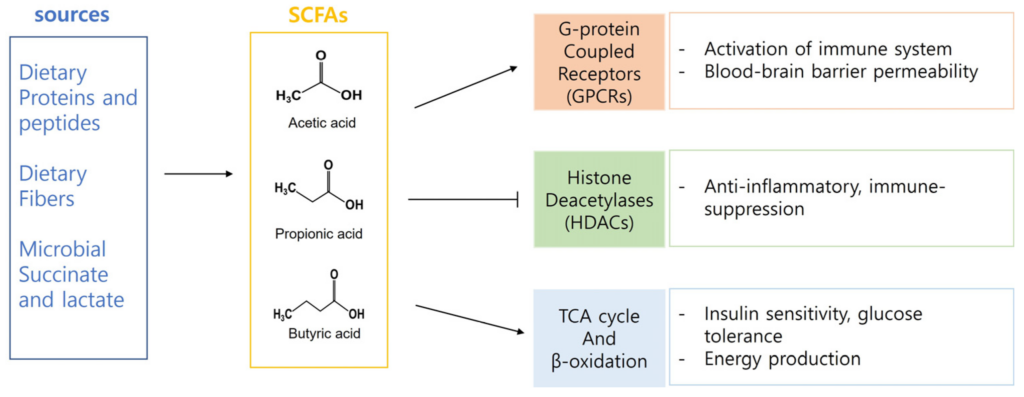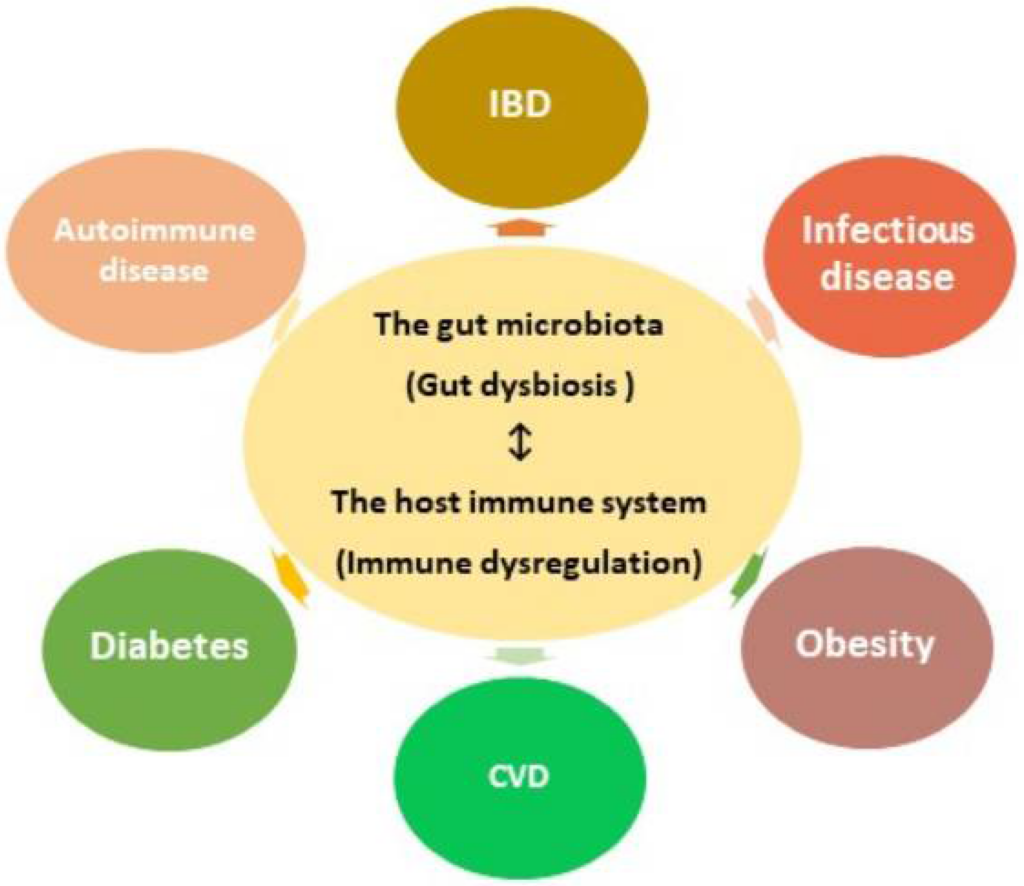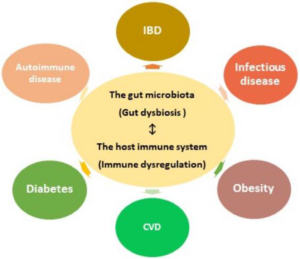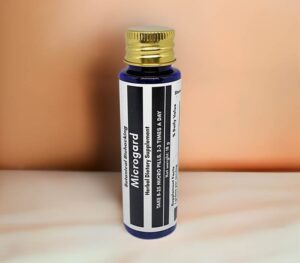Understanding Short Chain Fatty Acids And Chorus
Understanding the link between Short-chain Fatty Acids (SCFAs) and pain offers a promising avenue for those suffering from chronic pain conditions. By nurturing your gut microbiome through diet and supplements like Chorus, you can harness your body’s natural mechanisms to combat inflammation and improve your health.
Supplements like Chorus can help regulate inflammation, a key factor in chronic pain, by regulating the production of short-chain fatty acids.
Key Takeaways
Understanding SCFAs
SCFAs are produced by gut bacteria fermenting fiber and have potent anti-inflammatory effects.
Sources of SCFAs
Increase your intake of fermentable fibers in foods like green bananas, plantains, beans, lentils, and oats to boost SCFA production
Role of SCFAs
SCFAs influence brain function, immune response, and nutrient metabolism, extending their benefits across the body
Chorus Supplement
Chorus is designed to enhance SCFA-producing gut bacteria, improve gut health, and support chronic pain management
Immune Regulation
SCFAs modulate immune cells by interacting with specific receptors, reducing the production of inflammation-promoting cytokines and thus easing pain
Epigenetic Influence
SCFAs can modify gene expression by affecting histone structures, helping to reduce inflammation at the genetic level.
Strengthening Gut Barrier
SCFAs enhance the gut barrier, preventing harmful substances from inducing systemic inflammation and thereby reducing pain triggers
Energy and Metabolism
SCFAs influence how the body manages and uses energy, aiding in fat burning and reducing inflammation, which impacts pain perception.
What are Short Chain Fatty Acids?
Short-chain Fatty Acids (SCFAs) are crucial fatty acids with fewer than six carbon atoms. The human body does not have the ability to produce its own SCFAs, so they are primarily produced in the gut through the fermentation of fiber and resistant starches by beneficial bacteria.
Resistant starches are a type of carbohydrate that resists digestion in the small intestine and instead ferments in the large intestine. Common sources of resistant starches include green bananas, plantains, beans, lentils, and oats.
These SCFAs, mainly acetate, propionate, and butyrate, nourish the cells in your large intestine and have significant anti-inflammatory properties, which are essential for managing pain and overall health.

Impact of SCFAs on Health
Recent research has begun to unveil the broad impact of these microorganisms, influencing everything from brain function and immune response to how our bodies metabolize medications and absorb nutrients. The role of SCFAs extends far beyond simple digestion, affecting systemic health in profound ways.
Reducing Chronic Pain

Immune Cell Regulation
G-Protein Coupled Receptors
Short Chain Fatty Acids modulate immune cell functions, such as macrophages and T cells, by interacting with specific receptors (GPR41 and GPR43). This interaction suppresses the production of pro-inflammatory cytokines, which are often precursors to pain, thereby reducing inflammation.
G-protein coupled receptors (GPCRs), are on the surfaces of immune and endothelial cells act like security checkpoints, sensing and responding to specific substances—like SCFAs. Think of SCFAs as the right keys to these checkpoints. Once they bind to and activate GPR41 and GPR43, these receptors initiate a cascade of signals within the cells. This activation plays a pivotal role in mobilizing leukocytes, a type of white blood cell, directing them towards areas of inflammation to combat infection or repair tissue damage. This helps manage and reduce inflammation and ensures that our immune system responds adequately without overreacting, which can prevent excessive inflammation and the potential for related health problems.
Epigenetic Modifications
Histone Deacetylase Inhibition
Short Chain Fatty Acids particularly butyrate, play a role in epigenetic changes by inhibiting histone deacetylases (HDACs). This action leads to the loosening of histone structures, making genes that reduce inflammation more accessible, thus altering gene expression to diminish inflammatory responses.
Your DNA blueprints are normally tightly rolled up and only read when needed. HDACs are like the librarians who keep these blueprints tightly rolled, but SCFAs can instruct these librarians to loosen up, making these genetic blueprints more accessible. When SCFAs like butyrate inhibit HDACs, they cause the blueprints to unroll slightly (a process known as acetylation), allowing the cell to read instructions that lead to reduced inflammatory responses. This not only helps reduce existing inflammation but also prevents excessive inflammatory reactions in the future.
Energy Metabolism
TCA Cycle
Short-chain Chain Fatty Acids influence the body’s energy balance by promoting fat oxidation and reducing fat synthesis. This not only helps in managing body weight but also modulates inflammation, which can affect pain perception.
Short-chain Chain Fatty Acids, like propionate and butyrate, play a crucial role in your body’s energy management and fat-burning processes across various organs. These SCFAs initiate a process known as intestinal gluconeogenesis, essentially helping your intestines produce sugar. This action enhances energy use through signals that travel from your gut to your brain. After being absorbed, a significant portion of these SCFAs, specifically about 80% of propionate and butyrate and 40% of acetate, is processed in the liver. Here, they help burn fat instead of storing it.
SCFAs that aren’t processed in the liver circulate in the bloodstream. In white adipose tissue, the type of fat where energy is stored, SCFAs help create new fat cells, increase fat burning, and decrease fat breakdown. They also promote the development of a special type of fat that excels at burning calories. In brown adipose tissue, known for its role in generating body heat, SCFAs enhance this heat-producing capability. Furthermore, in muscle tissue, SCFAs aid in developing muscle fibers that are more efficient at burning fat.
Strengthening Gut Barrier
Short-chain Fatty Acids strengthen the gut barrier by improving the integrity of the intestinal walls. Thus, harmful substances cannot trigger systemic inflammation, and a robust intestinal barrier can significantly reduce the triggers for chronic pain conditions.
Imagine your gut lining as a wall that separates your gut from the rest of your body. This wall is made up of cells bound tightly together, crucial for blocking harmful substances like certain bacteria and toxins while letting nutrients through.
Butyrate acts like cement for this wall, strengthening the bonds between cells to keep the barrier strong and prevent harmful substances from leaking into the bloodstream. A robust gut barrier reduces the need for your immune system to respond aggressively, leading to less body-wide inflammation. By maintaining a strong and effective gut lining, butyrate significantly helps control inflammation and protect your health, which is vital as a weakened gut barrier can increase inflammation and contribute to various chronic health issues
Tips to Regulate Short Chain Fatty Acids
1. Increase Dietary Fiber Intake
Boost SCFA production by eating a diet rich in fermentable fibers such as inulin, resistant starch, and pectin. Foods like legumes, oats, and bananas are excellent choices.
2. Probiotic Supplementation
Incorporate probiotics such as Bifidobacterium and Lactobacillus, which can support SCFA-producing bacteria
3. Sweat Regularly
Regular physical activity and sweating can promote a healthier microbiome
4. Limit Processed Foods and Refined Carbohydrates
Reduce intake of processed and high-sugar foods, favoring whole, unprocessed foods instead.
5. Manage Stress
Use stress management techniques like abdominal massage or deep breathing to support gut health
Chorus is designed to boost gut bacteria that produce SCFAs.
About the Author
Willard Sheppy is a writer and healthcare practitioner who seamlessly melds scientific knowledge with practical applications in engaging and authoritative articles. He holds a Bachelor of Science in Environmental Science from Oregon State University and a Master’s in Acupuncture and Oriental Medicine from the distinguished Oregon College of Oriental Medicine.
In his work, Willard skillfully combines his extensive educational background in scientific research with his practical experience as a healthcare practitioner. Willard balances his life with martial arts and cherished family adventures. As a father of three, he often leads his family on camping and hiking trips along the breathtaking Oregon coast.
Connect with Willard on LinkedIn at linkedin.com/in/valleyhealthclinic or learn more about his services at valleyhealthclinic.com. Embark on this journey towards holistic health with Willard!








